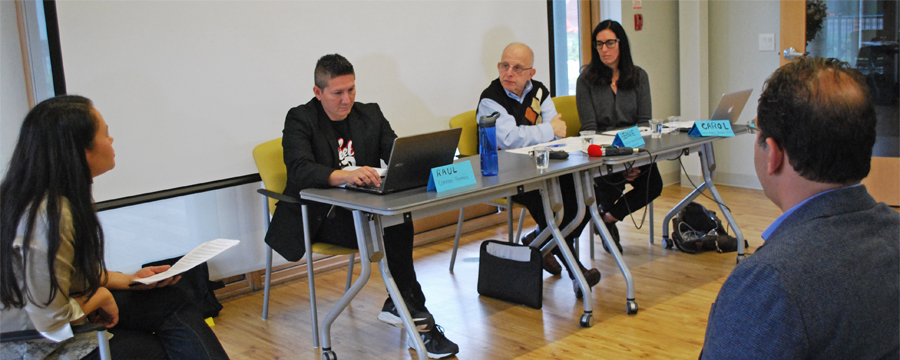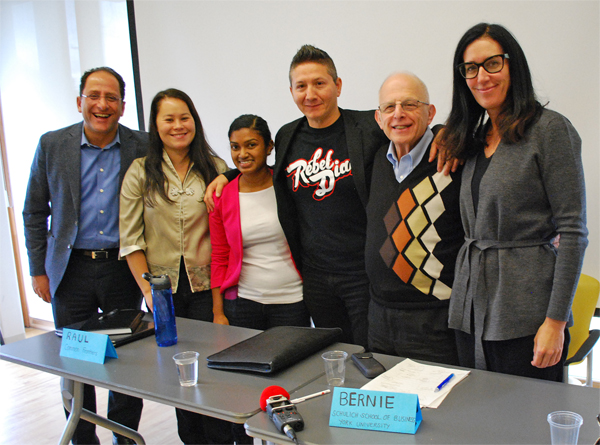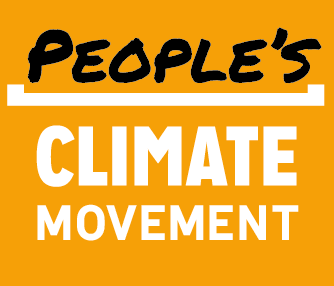
Trans-Pacific Partnership
Community Town Hall
at the Bathurst-Finch Community Hub
North Yorth, October 30th, 2016
The town hall was organized by the Bathurst-Finch Social Action Group, in collaboration with the People’s Climate Movement, Social Planning Toronto, and The Council of Canadians (Toronto). It was held at Unison Health and Community Services – Bathurst-Finch Hub.
Presentations by three subject-matter experts led to a lively discussion among the panelists and with the audience, who submitted questions. The event was attended by Ali Ehsassi, Member of Parliament for Willowdale, who welcomed the participants. Opening remarks were by SAG member, Vicki Jewt. The discussion facilitator was Emmay Mah from PCM.
The Panel of Experts (left to right)
- Raul Burbano, Common Frontiers, speaking on labour and trade justice.
- Bernard M. Wolf, Professor Emeritus of Economics and International Business at Schulich School of Business,
Area of expertise: economics and international business. Research interest: globalization - Carol Devine, Doctors Without Borders, speaking on the Canadian Health perspective and intellectual property
Main Points by Raul Burbano – Common Frontiers (Notes provided by SAG member, Vicki Jewt)
- The TPP was negotiated in secret, until Wikileaks released the information 2 year ago.
- The TPP is not a tree trade deal; it is a corporate trade agreement.
- It affects many areas including our environment and health
- This agreement benefits the multinational corporations; not the mom and pop shops
- It affects labour and precarious work, and we the rise of inequality on a global scale.
- It also affects human rights, since it does not ensure the supremacy of human rights on a global scale.
- The TPP has the corporate investment chapter, which includes the Investor State Dispute Settlement (ISDS) process. These are closed-door tribunals in which a corporate entity can sue a country’s government for millions to billions of dollars for profit loss or potential loss
- Canada was sued under NAFTA, in one case, for $200 million in penalties.
- There is also an impact on public services under these retro and stand-still clauses.
- ISDS can create the chill effect, preventing governments from passing new regulations
- There needs to be a fundamental change in the way these agreements happen.
Question 1: about ISDS
The ISDS process bypasses our judicial courts. The tribunals are non-transparent. Citizens cannot sue corporations in these courts.
Question 2: about the Impact on Canadian Jobs
We have lost jobs in the manufacturing section under other trade agreements. It’s unfair. The multinational corporations that benefit are the 1%.
Main points by Bernard Wolf – Professor Emeritus at the Schulich School of Business
- NAFTA and the TPP have positive aspects; it would be suicidal not to join the TPP.
- We have to evaluate what we have done wrong; in everything there are winners and losers.
- We have not distributed the gains of the trade deals appropriately. This has lead to inequality in income.
- People disadvantaged by the agreements should be compensated.
- There are gains however: we have gained in lower prices with things made in China.
- There is a real opportunity in terms of Asia; it is a fantastic market opening to Canada.
- If you specialize in the things that you’re able to do well, you will succeed.
Question 1: Elaboration on the concept of winners and losers
The losers are the groups that are non-competitive. The winners are those that are competitive
There are tradable services (from the financial community and manufacturers)
If you don’t want to be wiped out, you can do something different, e.g. like Canadian wine makers – when they lost their protection, they started growing different grapes- a success story.
Question 2: What is in the TPP for the young entrepreneur?
Trudeau signed CETA. Look at Brexit: the young people were the ones that wanted to stay.
By putting walls around ourselves, we lock ourselves in, which is silly.
Question 3: There are 2 presidential candidates who are not on board…
When trade declines, the world economy declines. If we continue to be anti-trade, we are going backwards.
Question 4: How do we protect our public purse?
It really depends on the tribunals; there should be protections built in.
Main points by Carol Devine – Doctors Without Borders Canada/Médecins Sans Frontières (MSF)
- Doctors Without Borders is independent and neutral, and looked at the health aspect.
- Doctors Without Borders is pro-trade and pro-competition, and 94% of the drugs they use are generic
- There are provisions in the TPP that harm health and access to affordable medicine.
- the TPP requires countries to grant additional 20-year patents for modifications of existing medicines, as well as for new uses, methods of use or new processes of a known product. This will cause prices to rise
- Medical kits are too expensive
- Competition by generic manufacturers reduces prices and increases access. The TPP restricts it.
- The TPP requires countries to protect clinical trials data with additional periods of exclusivity: another way to keep prices high for longer and further delay competition.
- Canada will be impacted by these provisions and third world countries will be even harder hit
- Pharma becomes a monopoly.
- Canada has contributed more than one billion dollars to Gavi, (the Vaccine Alliance), to improve access to affordable vaccines in developing countries. The TPP undermines this investment.
- The TPP raises the bar for pharmaceuticals and lowers the bar for us.
Points during Question/Discussion period:
Diseases don’t care about borders, and they don’t care about socio-economic status.
The TPP will hold back solutions in a big crisis like Ebola.
Canada is leading in vaccines, which is good for everyone. We are slapping our own hand with the TPP.
Innovation will also be impacted; the TPP is anti-innovation.
2nd Hour: Question and Answer Period with the Audience
Question 1: What mechanisms can be put in place to compensate the people who lose their jobs?
Bernie: Funds need to be allocated to re-training people. People can make the transition to retirement. People can be displaced if they retire. Far more people are displaced by technology than by trade agreements.
Question 2: Who is going to be paying for the retraining? What is the mechanism? There are mechanisms for investors, but there is no mechanism for the people.
Raul: We are moving away from full-time, well-paid jobs to precarious work. Free trade locks us into these agreements. CETA was signed. The TPP will do the same. What we need is fair trade.
Question 3: Is there a trickle down of profits? Or is it trickle up?
Raul: Capitalism needs reform as income inequality has gotten too large. We need to make better use of our tax dollars. We need to make education accessible. Democracy is required. Corporations are making more, if not most, of the decisions.
Carol: October 31, 2016, the public consultations close. These negotiations were done in secret. The people are supposed to be in charge of our democracy. The TPP will trickle up; it prioritizes profit over the public.
Question 4: What about the World Trade Organization (WTO)? It has principles in rules and roles.
Raul: It sets out the rules in which trade can be carried out. For the Doha Declaration, the TPP goes above it and says, “whatever.”
Bernie: Free trade agreements are managed trade agreements.
Question 5: Question for the MP: As the government, how do you make trade adjustments?
Answer: A good question, needs to be considered.
Question 6: What are the benefits of the TPP?
Bernie: There are benefits TPP for countries in South America, like Peru and Mexico.
Raul: Many people in the Mexico countryside were displaced and they had to move. So the people came north instead. There is compensation for the corporations, but there is no compensation for the people. We need to hold our MPs accountable on a regular basis.
Question 7: Where is China in this? China is not a signatory.
What are the implications of China not signing on? The politics does not allow it.
Question 8: Is not signing onto the TPP really suicidal?
Bernie: It’s not suicidal, but in terms of investment, Canada should sign on.
Carol: Canada missed an important process – the negotiation stage, and now health is at risk.
Question 9: Is the TPP the same as past agreements?
Bernie: it was a mistake to put so much into the oil sector. We need to support universities to foster a fast-moving society. University incentives need to change.
Raul: The Canadian Centre for Policy Alternatives is a great resource on this. (see Reports and Studies tab)
Question 10: Who is going to want to invest in Canada specifically because of this trade deal?
Bernie: Asia and South America. The Asian market has grown rapidly. Japan has a large economy Corporations wants Canada’s resources.

